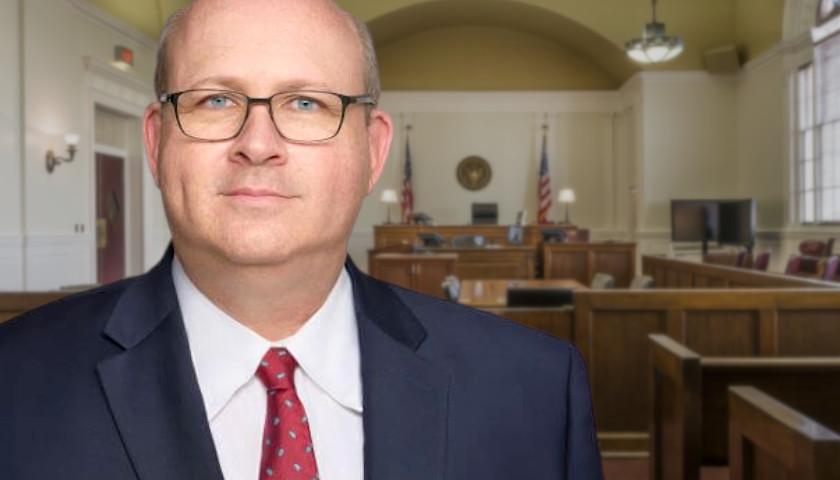House Bill (HB) 458 is a piece of legislation that Governor Mike DeWine signed on Friday that includes new photo ID requirements and put limits the number of ballot drop boxes that voters can use. The measure also substitutes a four-day deadline for the previous law’s 10-day deadline for mail-in ballot delivery.
Ohio residents 17 and older will be qualified to acquire a free state ID card as part of the new ID regulations.
Almost immediately after DeWine signed the legislation that would protect Ohio’s elections against fraud, Democratic attorney Marc Elias filed a lawsuit on behalf of the Northeast Ohio Coalition for the Homeless, the Ohio Federation of Teachers, the Ohio Alliance for Retired Americans, and the Union Veterans Council.
The lawsuit alleges that HB 458 “imposes needless and discriminatory burdens on Ohioans’ fundamental right to vote.” Plaintiffs contend that a number of provisions in the new omnibus election-administration law will severely impede Ohioans’ ability to cast ballots by requiring strict photo identification, placing restrictions on voters’ ability to “cure” provisional or rejected mail ballots, and limiting vote-by-mail.
According to Elias Law Group Partner Abha Khanna, the legislation is “a sweeping attack on Ohioan’s fundamental right to vote.”
“This bill makes it substantially harder for Ohioans to vote in person and by mail and makes it harder to correct simple mistakes that prevent ballots from being counted,” Khanna said.
Upon signing the legislation into law, DeWine noted that election integrity is a concern across the country and although he believes Ohio does a good job of avoiding the problems seen in recent federal elections.
“I believe with the enactment of the new election integrity provisions in House Bill 458, this matter should be settled, and I do not expect to see any further statutory changes to Ohio voting procedures while I am Governor,” DeWine said.
Democrats, civil rights groups, and veterans’ organizations all denounced the bill’s signing.
House Minority Leader Allison Russo (D-Upper Arlington) said in a statement “One of Ohioans’ most sacred rights has now carelessly been trampled on and the will of the voters has been brushed aside.”
Former state Representative and now head of the Ohio Democratic Party’s Veterans & Military Community Caucus Connie Pillich said “I am shocked that Gov. DeWine – or any member of the Ohio legislature – would actively disenfranchise our men and women in uniform. But that is precisely what this bill has done.”
The Ohio Christian Alliance vocalizes its support of legislation requiring voters to present a photo ID.
“The Ohio Christian Alliance supports voter photo ID requirement for Ohio. Ohioans are not fooled; they know that there are those who are trying to game the system of our election laws, and we want sound public policy to put an end to it,” Ohio Christian Alliance said.
The National Chairman of the Election Transparency Initiative and former Virginia Attorney General Ken Cuccinelli, applauded DeWine for signing the legislation despite threats of litigation.
“We applaud Governor DeWine and the legislature for helping restore faith in our elections by acting on this important legislation. The reality is that photo ID is overwhelmingly popular among virtually every voting demographic because it protects the right to vote in elections that are fair and secure,” Cuccinelli said.
Cuccinelli continued that although the mass-mailing of unsolicited absentee ballot applications continues anathema to election integrity, he is pleased that the new law at minimum adds a constructive reporting requirement bringing attention to this unsafe method of election management. He said that sadly, this provision does not set the bar for transparency that is necessary for effective oversight and, ultimately, gaining the confidence of voters. Cuccinelli stated that voters should be given access to frequently updated absentee voting data starting with the time applications are submitted.
He said he hopes that the legislature will continue to pursue voter reforms to address these matters in the 2023 legislative session.
“It’s our hope that the legislature will continue to address this important matter while pursuing additional reforms voters deserve, including ending ballot trafficking, requiring absentee ballots to be received by the time polls are closed on election night, and 24/7 video surveillance for drop boxes—to the extent they are not entirely banned—in the new legislative session,” Cuccinelli said.
Secretary of State Frank LaRose also praised the bill’s passing and noted polls demonstrating that most Americans usually support the use of photo IDs. According to a Gallup survey conducted last year, 79 percent of Americans, including percent of Republicans and 53 percent of Democrats, approve of picture ID requirements at the polls.
“Ohioans are clearly supportive of strict photo ID for voting and we have found a common-sense way to make it happen that ensures voters are not disenfranchised. No piece of legislation is a silver-bullet solution, but we are once again showing Ohioans that we take their concerns seriously and are dedicated to continuously improving our elections,” LaRose said.
Regarding ongoing litigation, a LaRose spokesman refrained from comment.
– – –
Hannah Poling is a lead reporter at The Ohio Star and The Star News Network. Follow Hannah on Twitter @HannahPoling1. Email tips to [email protected].
Photo “Mike DeWine” by Mike DeWine. Background Photo “Election Day 2022” by Phil Roeder. CC BY 2.0.





